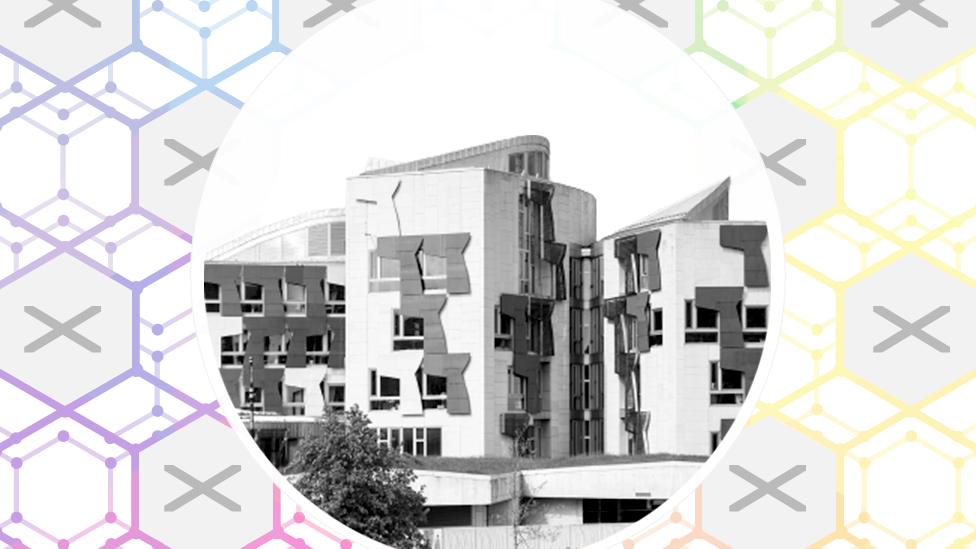Voting takes place in Scottish Parliament election
- Published
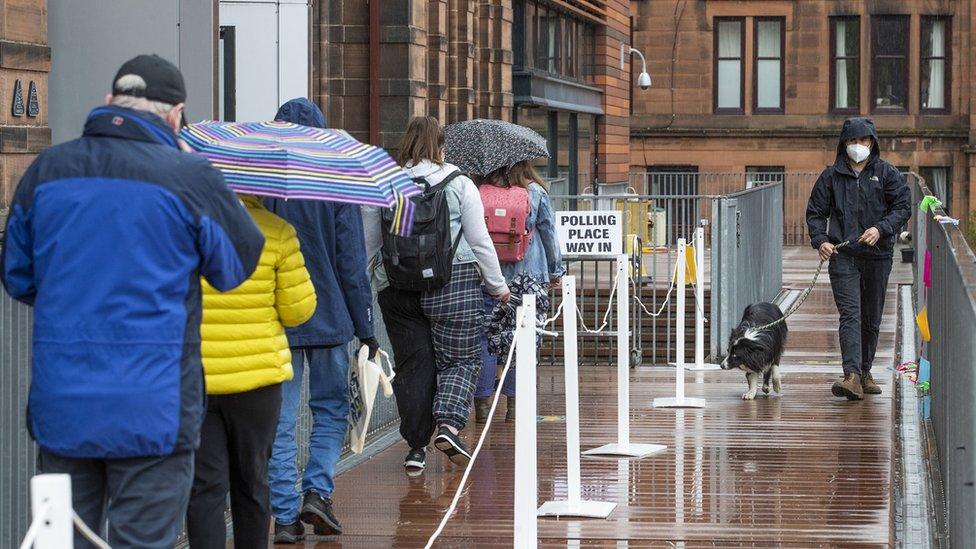
Voters queue in the rain to cast their ballots in Glasgow
Voting is taking place in the Scottish Parliament election, with polling stations open until 22:00 on Thursday.
Heavy overnight snow in some parts of the country led to wintry conditions for voters, particularly in the Highlands.
A record number of people have already cast their ballots - with more than a million having registered to vote by post.
Votes will not be counted overnight after the election because of Covid.
Instead, counting will start on Friday morning, with the final result expected on Saturday.
Scotland's party leaders all turned out at polling stations on Thursday morning.
SNP leader Nicola Sturgeon, who had already voted by post, was in Glasgow, which was where Scottish Labour's Anas Sarwar and Scottish Green co-leader Patrick Harvie cast their votes.
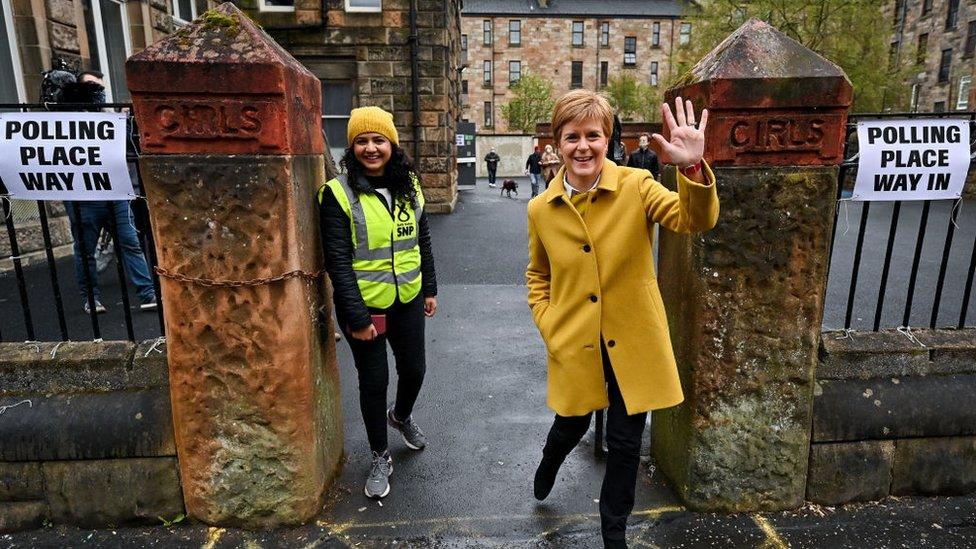
Nicola Sturgeon at Annette Street Primary School polling station in Glasgow
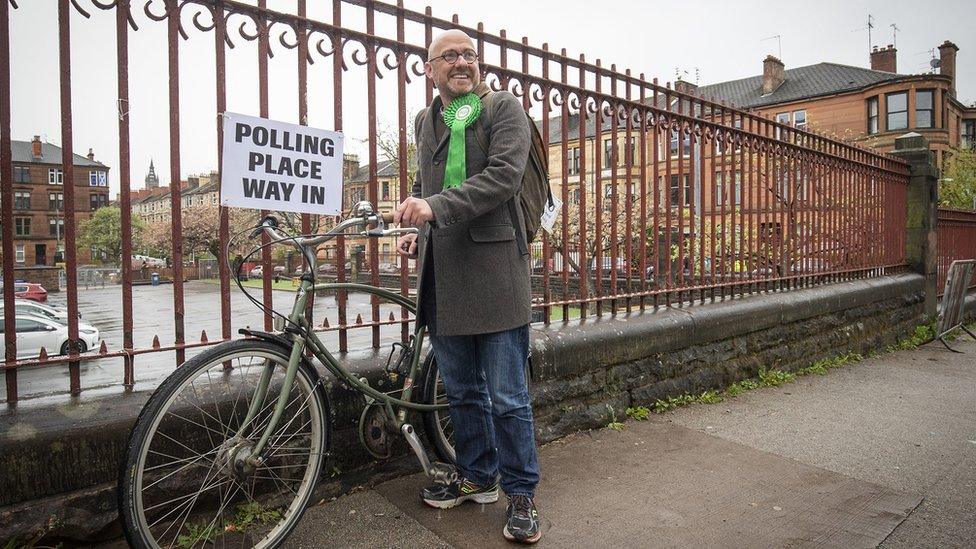
Scottish Greens co-leader Patrick Harvie arrives on his bicycle at Notre Dame Primary School
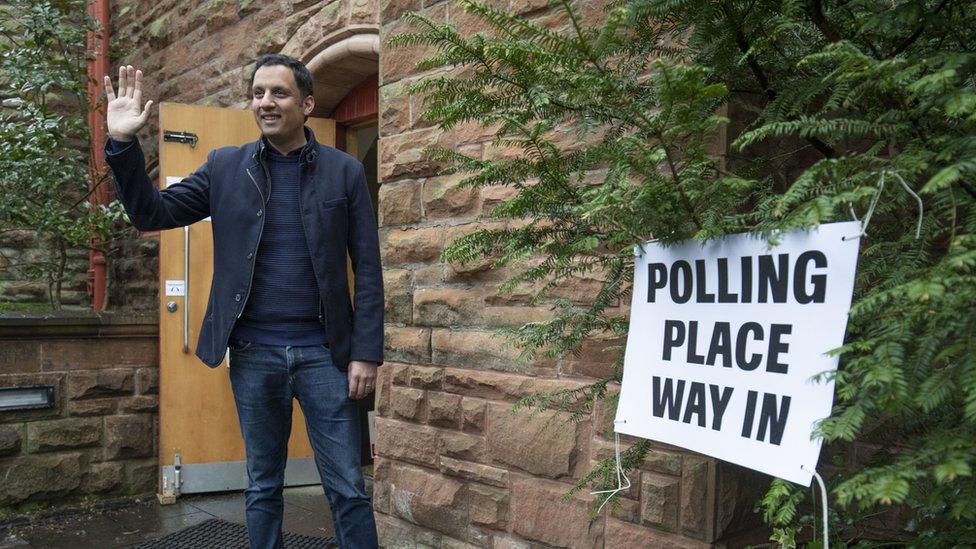
Scottish Labour's Anas Sarwar at Pollokshields Burgh Hall in Glasgow
Scottish Conservative leader Douglas Ross was at Alves Hall in Moray, while Scottish Liberal Democrat leader Willie Rennie - who had also voted by post - was at Strathpeffer Community Centre near Dingwall.
The election is seen as being crucial to the future of the UK as the result could impact on whether or not there is a second referendum on Scottish independence.
But it will also decide who forms the next Scottish government, which has considerable powers over areas such as health, education and income tax.
The pandemic means polling stations will feel different to normal - with voters being expected to wear face coverings and use hand sanitiser when they arrive.
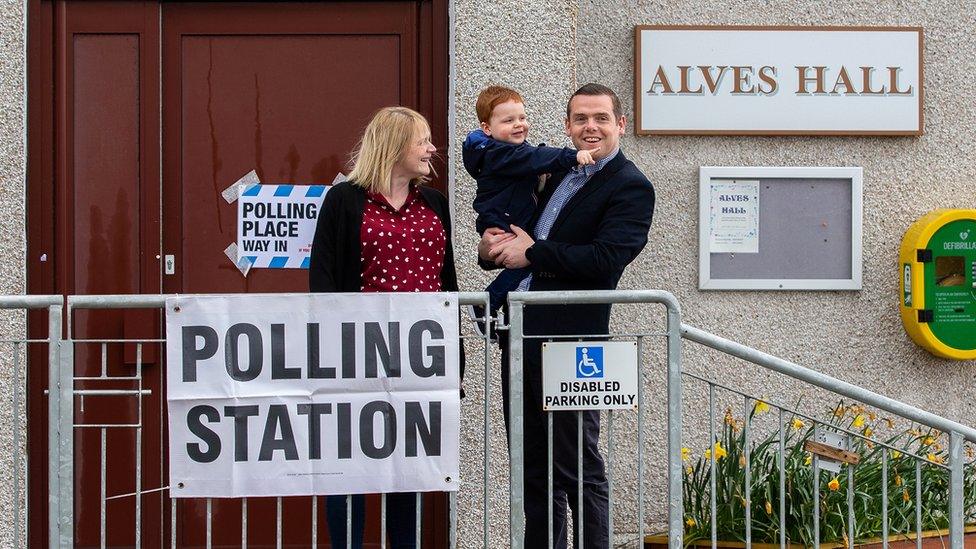
Scottish Conservative leader Douglas Ross with wife Krystle and son Alistair at Alves Hall

Willie Rennie arrives at Strathpeffer Community Centre
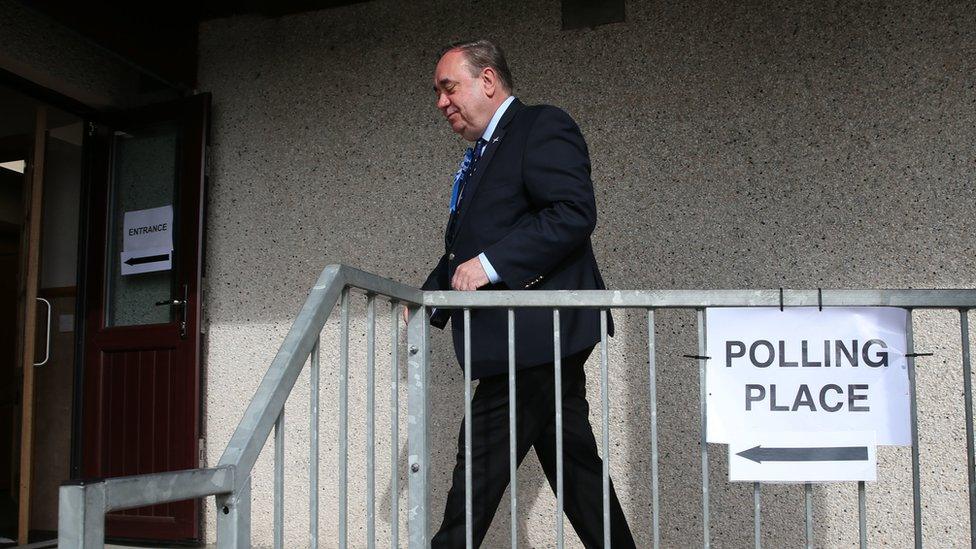
Alba Party leader Alex Salmond casts his vote at Ritchie Hall in Strichen, Aberdeenshire
The Electoral Commission has also recommended that voters bring their own pen or pencil to fill out their ballot papers - although clean pencils will also be available for use.
Physical distancing measures will be in place and there may be a one-way system in operation, depending on your polling place.
The Electoral Commission has also warned voters that they may have to queue to enter the building as there will be a limit on the number of voters allowed inside at any one time.
Anyone who tests positive for Covid-19 or who is in self-isolation will be able to apply for a proxy vote up until 17:00 on polling day, external.
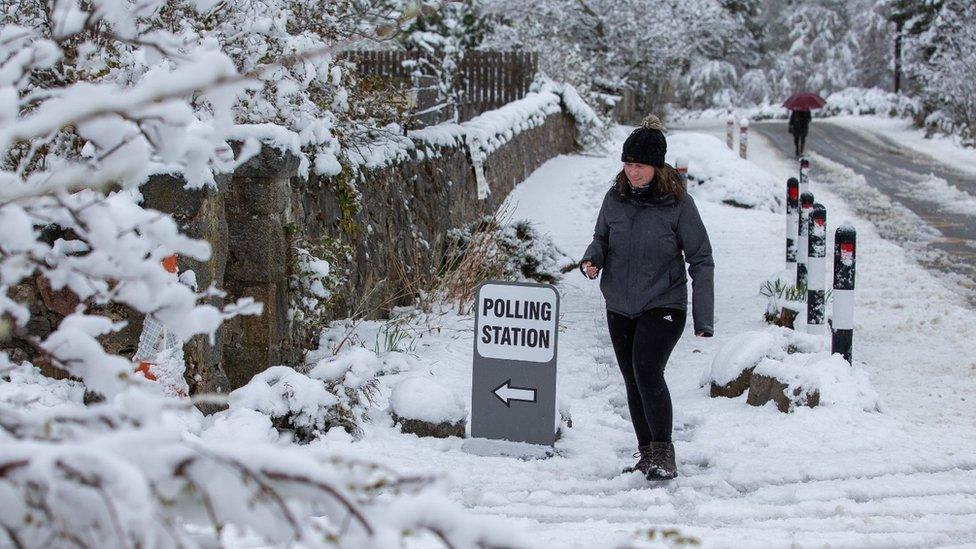
There was overnight snow for voters in the village of Farr, near Inverness
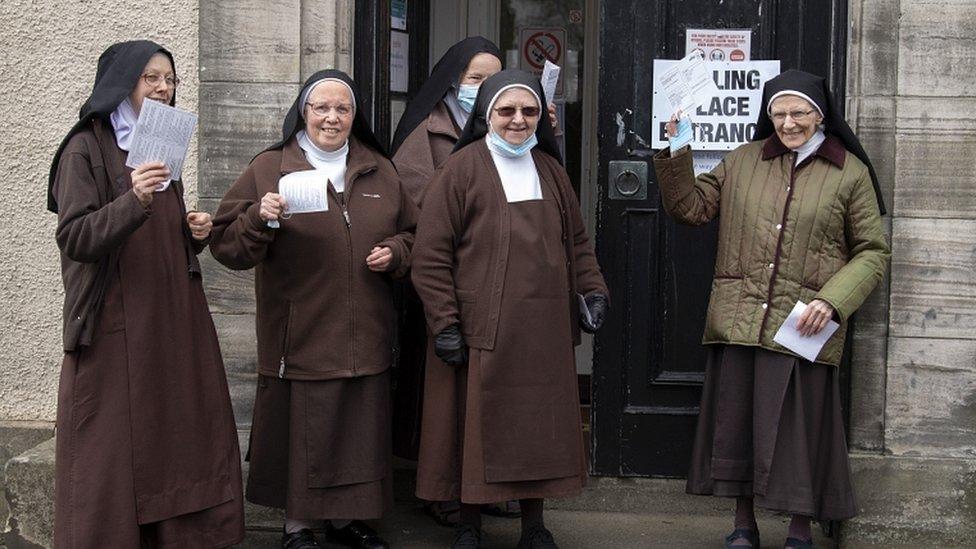
Nuns from Carmelite Monastery in Dysart, Fife, cast their vote at their local polling station
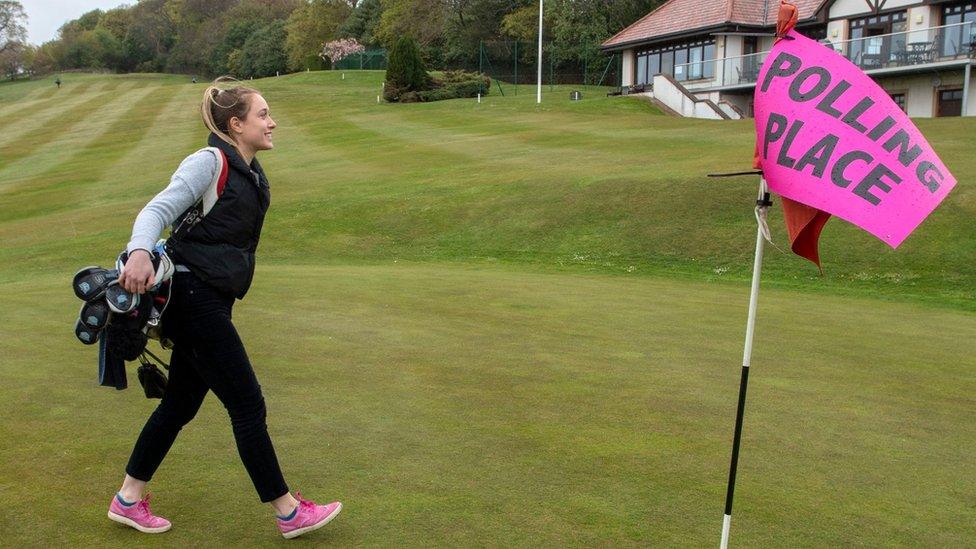
The clubhouse at the Merchants of Edinburgh Golf Club has been turned into a polling station for the first time
How do I vote in the election?
Anyone who lives in Scotland and is registered to vote is eligible, so long as they are aged 16 or over on the day of the election and have not been legally excluded from voting (for example because they are serving a prison sentence of longer than 12 months).
People have two votes - one for a constituency MSP, and another for a regional ballot.
There are 73 Constituency MSPs, each elected on a first-past-the-post system similar to the UK general election - the winner is the candidate who receives the most votes in each constituency.
Election 2021: How does Scotland's voting system work?
In the regional ballot, people vote for a party. The parties are then allocated a number of MSPs depending on how many votes they receive - once the number of constituencies already won in that region is taken into account - to make the overall result more proportional.
There are eight electoral regions, each with seven regional MSPs.
This means that people in Scotland are each represented by eight MSPs - one representing their constituency and the other seven representing their region.
The Scottish government is formed from the party that hold the most seats in the parliament, or alternatively a coalition of more than one party.
Other elections are also taking place across the UK on Thursday, including to the Welsh Parliament.
There are also elections for seats on 143 English councils and 13 local mayors, as well as a by-election for the Westminster seat of Hartlepool in the north east of England.
About 48 million people across Great Britain will be able to take part in the elections - many of them postponed from last year because of the pandemic.

SIGN UP FOR SCOTLAND ALERTS: Get extra updates on BBC election coverage

POLICIES: Who should I vote for?
CANDIDATES: Who can I vote for in my area?
PODLITICAL: Updates from the campaign

- Published22 April 2021

- Published7 May 2021
